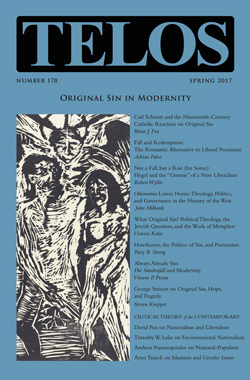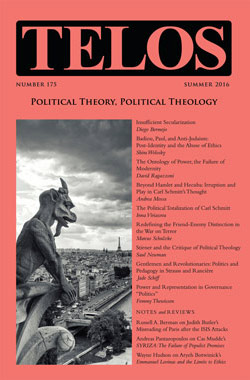Telos 178 (Spring 2017) is now available for purchase in our store.
 “If men were angels, no government would be necessary,” James Madison famously writes in Federalist No. 51. The defectiveness of the human will and the human intellect make government necessary, whether in John Calvin’s Sermon on the Galatians, which Madison echoes, in the locus classicus of this argument, Augustine’s City of God, or in book 9 of Plato’s Laws, which already describes humans’ innate capacity for evil as “a result of crimes long ago.” In modernity, Christian tropes like the Fall and original sin are used not only to justify political power, but also to temper utopian political goals. Reinhold Niebuhr emphasized the latter, for example, when he described the preference of the United States’ purportedly “Calvinist fathers” for relying upon checks and balances rather than the intelligence and goodwill of future American statesmen. Even the most familiar political analyses of original sin and the anthropology of Western Christianity contain this tension between justifying and limiting political power. “If men were angels, no government would be necessary,” James Madison famously writes in Federalist No. 51. The defectiveness of the human will and the human intellect make government necessary, whether in John Calvin’s Sermon on the Galatians, which Madison echoes, in the locus classicus of this argument, Augustine’s City of God, or in book 9 of Plato’s Laws, which already describes humans’ innate capacity for evil as “a result of crimes long ago.” In modernity, Christian tropes like the Fall and original sin are used not only to justify political power, but also to temper utopian political goals. Reinhold Niebuhr emphasized the latter, for example, when he described the preference of the United States’ purportedly “Calvinist fathers” for relying upon checks and balances rather than the intelligence and goodwill of future American statesmen. Even the most familiar political analyses of original sin and the anthropology of Western Christianity contain this tension between justifying and limiting political power.
Continue reading →
By Andrew M. Wender · Wednesday, March 8, 2017 If the phrase “asymmetrical warfare” is taken to connote scenarios where “one side is possessed of overwhelming power with respect to its adversary,” together with manifold embodiments “of asymmetry in media representations, ideology, religion, sub- and supra-national actors, the environment and even psychology,” then there would appear little doubt that today’s world is pervaded by such conflict. Necessarily, the unique historical conditions of the present, globalizing era—with its fragmenting as well as revanchist states, and its dizzying technological accelerations—are evoked by “new wars” that embroil a proliferation of non-state actors, along with states who believe that they should rightly monopolize (or be immune from, as the case may be) such asymmetrical modalities as nuclear arsenals, mercenary forces, drones, cyberattacks, and propaganda innovations.
Continue reading →
By Inna Viriasova · Tuesday, July 26, 2016 While “the political” is among the most studied aspects of Carl Schmitt’s thought, little attention has been paid to the notion of “the unpolitical,” which, I argue, plays a crucial role in understanding the totalizing status of the political. This essay, first, illuminates the symptomology of Schmitt’s political totalization; it shows how, despite its claim to autonomy, the political emerges as the total: an infinite potential that consumes human life as a whole. Second, this essay argues that the institution of political totality essentially relies upon the elimination of its radical outside—the “absolutely unpolitical.” Throughout his writings Schmitt presents the unpolitical as a merely “fictitious” reality. Meanwhile, what remains obscured is an originary event, the decision on the absolutely unpolitical, which institutes a pre-political field and thus grounds any subsequent political decision.
Continue reading →
By Saul Newman · Friday, July 15, 2016 When Carl Schmitt declared in Politische Theologie (1922) that “All significant concepts of the modern theory of the state are secularized theological concepts,” one could be forgiven for thinking he was directly invoking Max Stirner, who, in Der Einzige und sein Eigenthum (1845), launched a devastating assault on the religious categories that haunted modern thought and politics. While Schmitt and Stirner are approaching the question from opposed perspectives, they are nevertheless engaged in an investigation of the relationship between theology and politics. This article shows how Stirner’s unmasking of the Christianizing impulse behind modern secular humanism—particularly that of Ludwig Feuerbach—and his critique of liberalism, leads us to a radically atheistic politics in which the sovereignty of the state and its accompanying figure of the liberal individual, are deconstructed. Central here is the notion of the insurrection as a revolt against “fixed ideas” and their hold over us. Through his figures of the unique one, ownness, and insurrection, Stirner provides us with an alternative, non-theological language for subjectivity and politics that avoids the chain of substitutions underpinning the theological drive of modern secularism.
Continue reading →
By Shira Wolosky · Monday, June 27, 2016 Paul has emerged as central to some of the most prominent European intellectuals today, notably Alain Badiou in Saint Paul: The Foundation of Universalism. On the one hand, Badiou claims his philosophy to be a post-metaphysics in accord with postmodern critiques of traditional ontologies. He thus empties Paul of either historical or supernatural content. And yet, Badiou reconstructs what amounts to a secular political theology that strikingly reproduces the dogmatism of metaphysics. As his title announces, Badiou resurrects Paul in the name of universalism. Universalism claims to be, and indeed often is, an attempt to safeguard and respect everyone equally. But in Badiou universalism restages the erasure of difference and multiplicity in human experience that launched metaphysical critique in the first place. As secular venture what he ironically demonstrates is how tenacious traditional metaphysical unity remains even in apparently post-theological discourses.
Continue reading →
By Russell A. Berman · Monday, June 13, 2016  Critical theory inherited the mission of philosophy to know the world and to pursue the good life. Careful examination should shed light on the cosmos and our place within it and contribute to a beneficial ordering of human concerns, when wisdom informs governance. Yet that aspiration to know the world encountered the limits of intelligibility, beyond which reason could not proceed. Meanwhile, the efforts to remake the world in the spirit of reason elicited processes of rationalization, as deleterious to the world around us, the natural environment, as to the world within us, the ongoing cultural crisis of modernity and its social corollaries. That is Horkheimer and Adorno’s dialectic of enlightenment at the foundation of the critical theoretical tradition that continues to provide a framework with which to articulate a critique of the contemporary in its many heterogeneous facets: the disruption of all forms of solidarity, the pressures on family structures, the erosion of educational opportunities, the growing gap between rich and poor. Add to this the ominous shifts in the international order, including the breakdown of state structures from North Africa through the Middle East, the strains on the European Union, and the return of a repressive semi-dictatorship in Russia, while—at this point in the presidential election season—the United States seems to be tumbling dangerously toward Weimar conditions. Critical theory inherited the mission of philosophy to know the world and to pursue the good life. Careful examination should shed light on the cosmos and our place within it and contribute to a beneficial ordering of human concerns, when wisdom informs governance. Yet that aspiration to know the world encountered the limits of intelligibility, beyond which reason could not proceed. Meanwhile, the efforts to remake the world in the spirit of reason elicited processes of rationalization, as deleterious to the world around us, the natural environment, as to the world within us, the ongoing cultural crisis of modernity and its social corollaries. That is Horkheimer and Adorno’s dialectic of enlightenment at the foundation of the critical theoretical tradition that continues to provide a framework with which to articulate a critique of the contemporary in its many heterogeneous facets: the disruption of all forms of solidarity, the pressures on family structures, the erosion of educational opportunities, the growing gap between rich and poor. Add to this the ominous shifts in the international order, including the breakdown of state structures from North Africa through the Middle East, the strains on the European Union, and the return of a repressive semi-dictatorship in Russia, while—at this point in the presidential election season—the United States seems to be tumbling dangerously toward Weimar conditions.
Continue reading →
|
|
 “If men were angels, no government would be necessary,” James Madison famously writes in Federalist No. 51. The defectiveness of the human will and the human intellect make government necessary, whether in John Calvin’s Sermon on the Galatians, which Madison echoes, in the locus classicus of this argument, Augustine’s City of God, or in book 9 of Plato’s Laws, which already describes humans’ innate capacity for evil as “a result of crimes long ago.” In modernity, Christian tropes like the Fall and original sin are used not only to justify political power, but also to temper utopian political goals. Reinhold Niebuhr emphasized the latter, for example, when he described the preference of the United States’ purportedly “Calvinist fathers” for relying upon checks and balances rather than the intelligence and goodwill of future American statesmen. Even the most familiar political analyses of original sin and the anthropology of Western Christianity contain this tension between justifying and limiting political power.
“If men were angels, no government would be necessary,” James Madison famously writes in Federalist No. 51. The defectiveness of the human will and the human intellect make government necessary, whether in John Calvin’s Sermon on the Galatians, which Madison echoes, in the locus classicus of this argument, Augustine’s City of God, or in book 9 of Plato’s Laws, which already describes humans’ innate capacity for evil as “a result of crimes long ago.” In modernity, Christian tropes like the Fall and original sin are used not only to justify political power, but also to temper utopian political goals. Reinhold Niebuhr emphasized the latter, for example, when he described the preference of the United States’ purportedly “Calvinist fathers” for relying upon checks and balances rather than the intelligence and goodwill of future American statesmen. Even the most familiar political analyses of original sin and the anthropology of Western Christianity contain this tension between justifying and limiting political power. 







